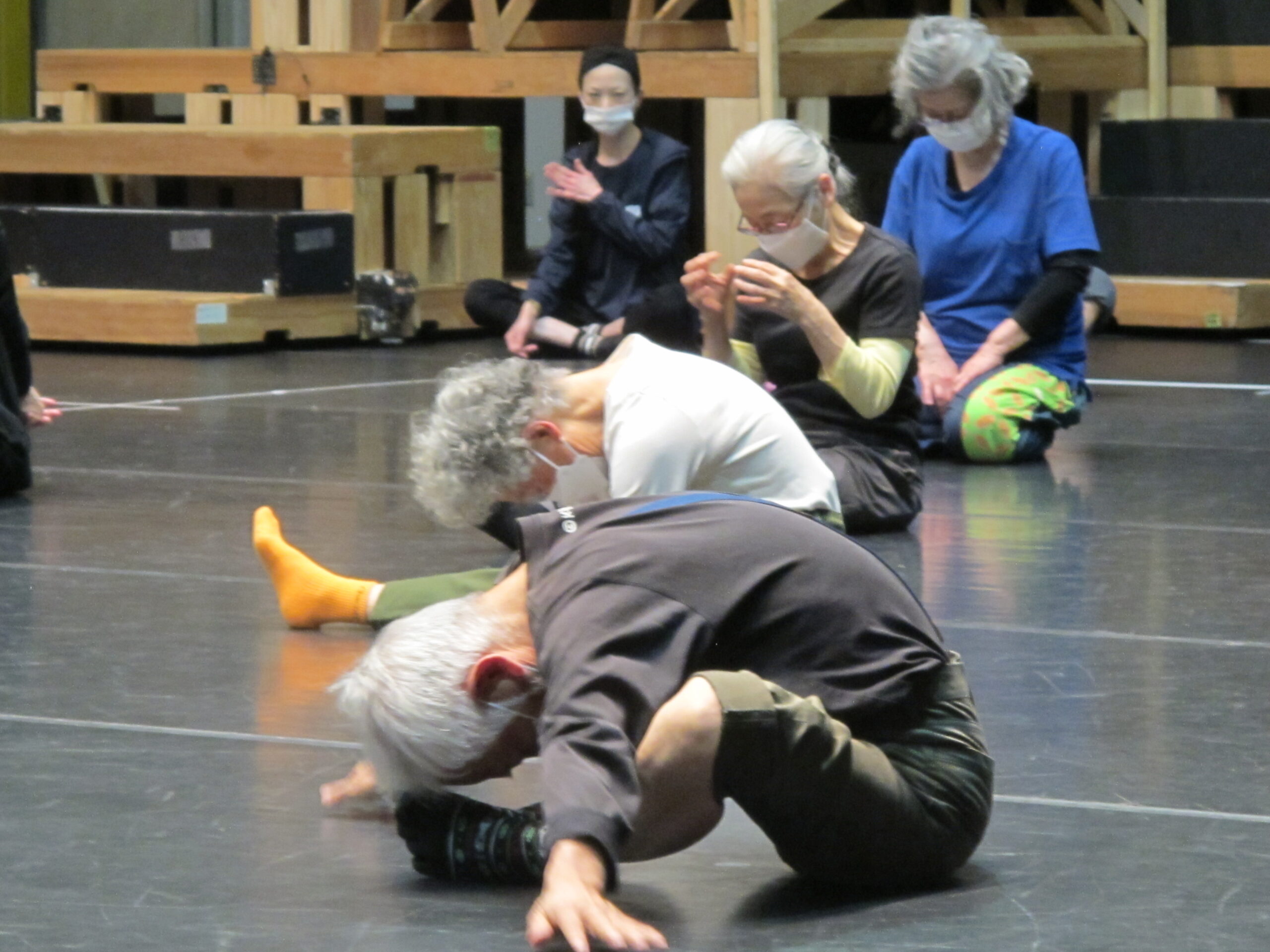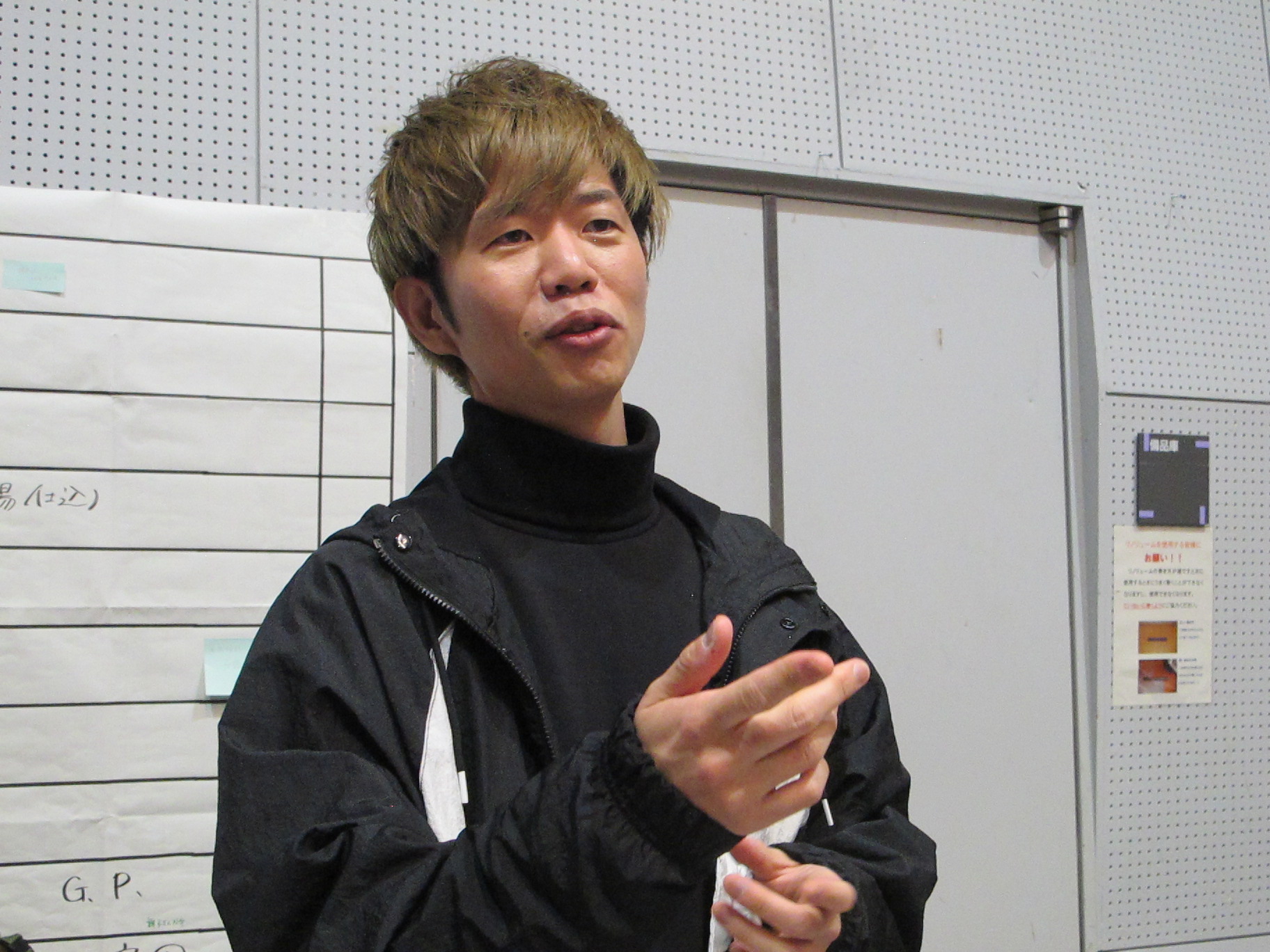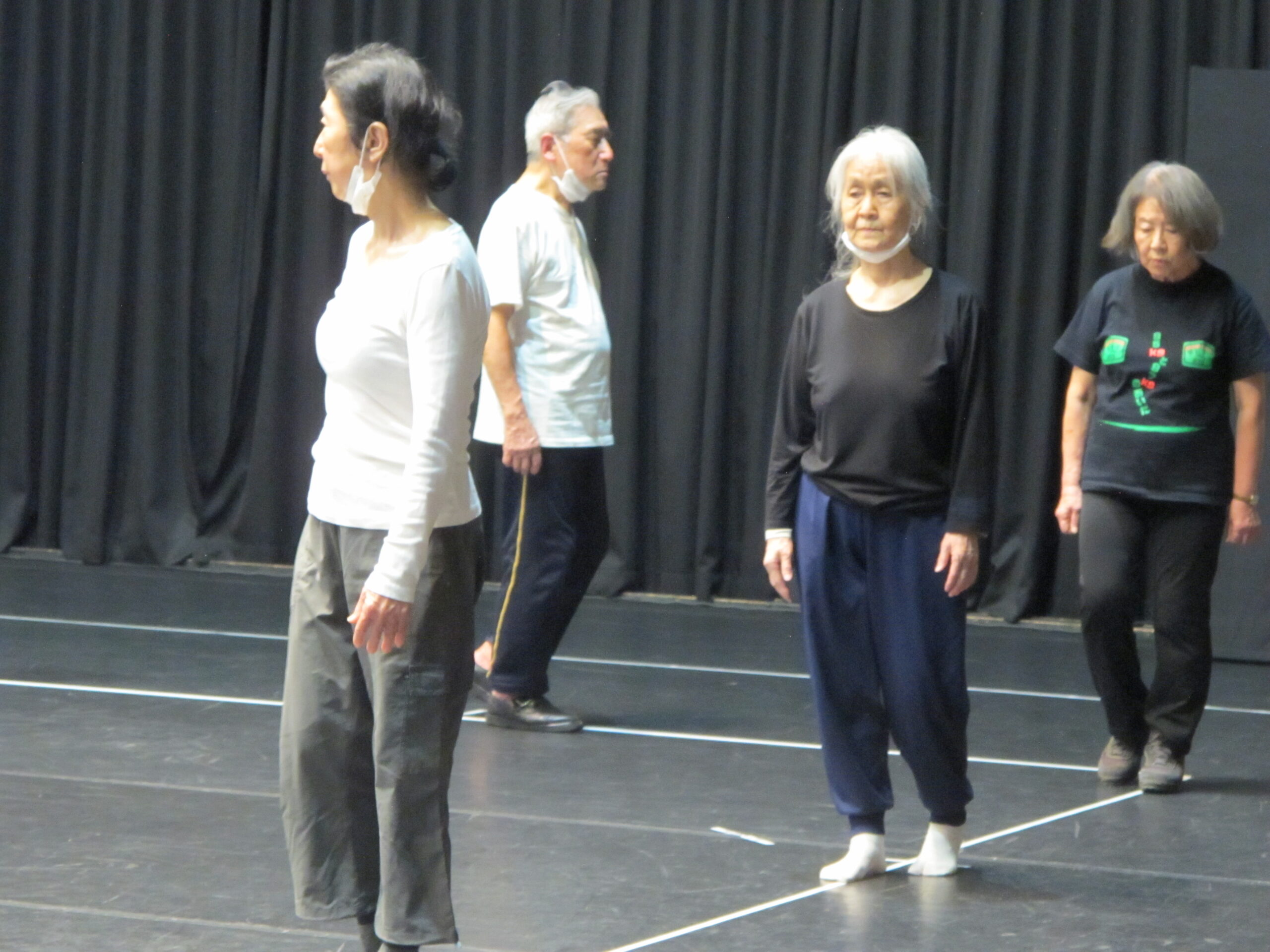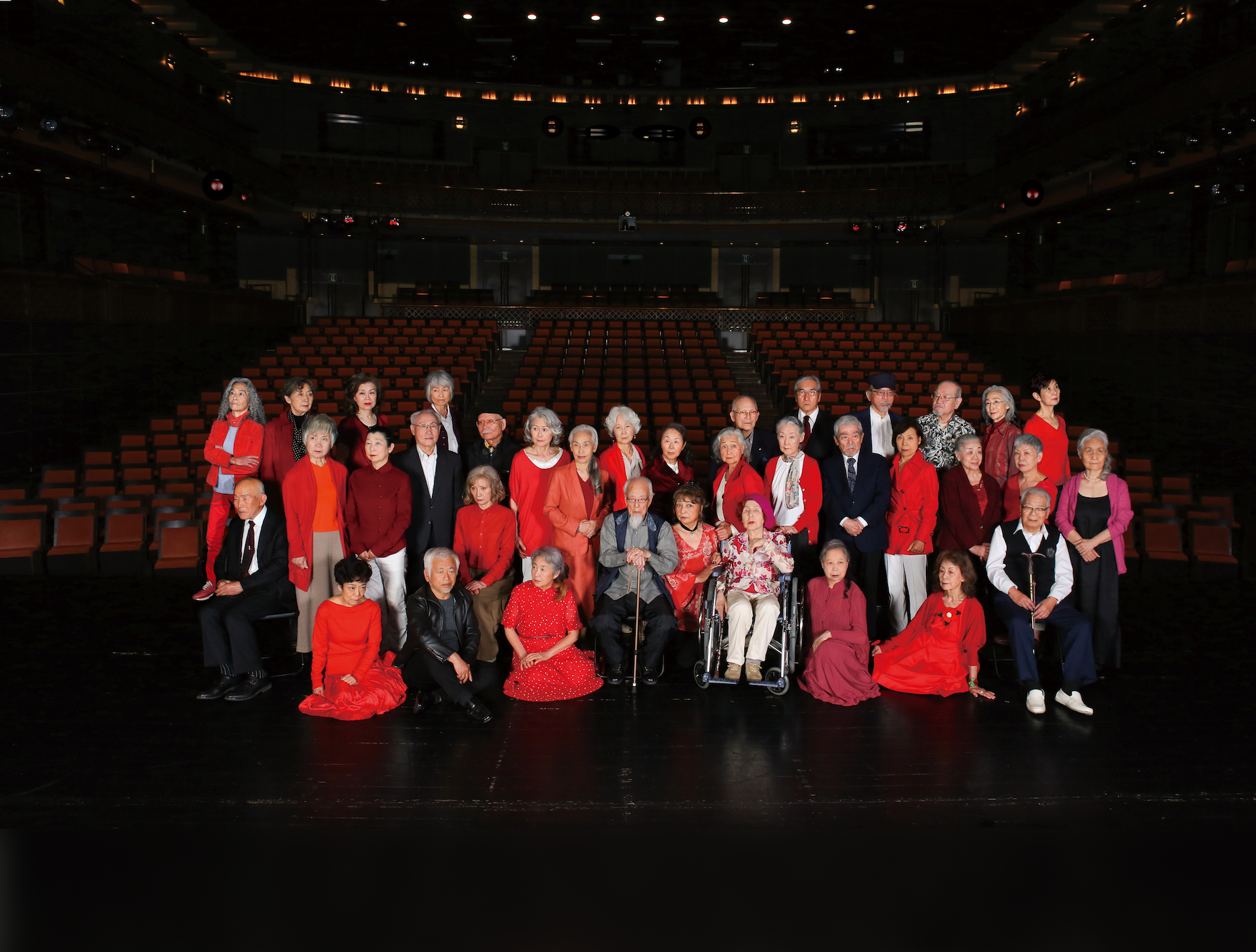
— SGT members are warming up for the rehearsal
“I will miss it a lot and I’m sad that Saitama Gold Theater is finishing after ‘Mizu no Eki’ (‘The Water Station’), though I don’t see any alternative because we’ve all simply become much older,” 75-year-old Mitsuyo Obuchi says in a rehearsal room at Saitama Arts Theater.
That rueful reality was echoed by her fellow SGT actor Toshiko Tsumura, who said, “I’m now 86 and I think I’ve reached my personal time limit, but I feel sorry for younger members who maybe joined when they were 55 and are only in their early 70s and could still do so much more.
“I wish they could continue, but Saitama public theater has decided now’s the time to wind up the company.”
SGT was launched in 2006 by the world-famous theater director Yukio Ninagawa, then the artistic director of Saitama Arts Theater in Saitama City. To assemble his troupe based there he invited seniors aged 55 and over to open auditions that attracted 1,226 applicants up to the age of 80 from all over Japan. From these, just 48 people — with an average age of 66.7 — were chosen to join SGT and pursue their dreams to perform as actors on stage.
Obuchi remembers those days but says, “I thought we would be guinea pigs for an experiment by Ninagawa to get an inner circle of oldies to study theater. I never imagined we would be the leading players in proper performances that people paid to come and see.
“But ever since he summoned the media to announce Saitama Gold Theater’s foundation, I’ve spent the last 15 years with my mouth wide open in surprise.”
In fact the company exceeded almost all expectations. Besides performing around Japan and collaborating with leading dramatists such as Ryo Iwamatsu, Keralino Sandorovich and Shu Matsui, it also garnered great reviews and packed audiences in Paris, Hong Kong and at the International Shakespeare Festival în Craiova, Romania.
Its abundance of laurels, however, cannot disguise the fact that many of SGT’s remaining 33 actors — who were all in the original 48 — are now over 80. Hence the decision to make “Mizu no Eki” its swansong was hardly unexpected, especially in the face of Covid-19.
Consequently, 14 women and four men are now tackling Shogo Ota’s non-verbal 1981 masterpiece that’s acclaimed the world over following tours by his Tenkei Gekijo company to Australia, the United States, Canada, South Korea and several European countries before his death in 2007.
This time, the play’s staging has been entrusted to the highly rated rising director Kunio Sugihara in his debut with SGT.
“When I got this chance to direct ‘Mizu no Eki’ I didn’t know it would be SGT’s final production,” the 39-year-old dramatist says. “In fact I wondered if I was the right person for such an important event, because I was just a fan of Ninagawa’s great works.”
“Then I remembered that when he founded SGT he said he wanted to make a new place where mature older people could find new faces and perspectives through physical expression.
“And since this non-verbal play is an ultimate form of physical expression, I believe it will be appropriate for their grand finale.”
As for the company itself, Sugihara says he’s already in no doubt it’s completely unique.
“SGT may look like a punkish troupe of oldsters, but they are very charming and — first and foremost — they’re just very straightforward and honest. So, even if I get tired having to speak in a loud voice because some of them have difficulty hearing, it’s very enjoyable,” he says with a laugh.
As for an actor’s view of this work, Obuchi says, “Right from the start till the very last moment, doing a non-verbal play really is a hard challenge. Hence, this is actually a very fitting way to mark the end of the era of Ninagawa’s pioneering SGT.”
Tsumura chuckles at this and says, “Of course I thought it was lucky this is non-verbal because I didn’t need to remember lines. Then I realized it’s more difficult to express the story silently just with my movements.
“When the rehearsals started we repeated again and again just walking very slowly. As we are old, it’s so difficult just to walk for a long time … our legs are shaky, and our bodies wobble.”
“But walking is the basis of any acting,” Obuchi adds, “and I am excited to be learning such fundamental things even now.”

— Kunio Sugihara/the director
Asked what this wordless work is all about, though, Sugihara only says it has a rough plot in which people — among them a girl, two men, a man and a woman, and an old lady — approach a dripping tap and touch or play with the water before leaving one after another.
Basically that’s it. Some of them fight, others put their legs under the water and have a rest, and a few — including Obuchi — appear to be carrying dead bodies.
Commenting on this, the actress says, “People get to the tap to drink water and charge themselves with energy to live till tomorrow. So the play is about the nature of living and sensual connections. But it’s also about death, and my role is to face death, I think.”
Throughout, no one speaks and there’s no explanation about anyone’s background, so everything is expressed with mime and audiences can imagine about the characters for themselves.
The only extra hint Sugihara offers is to say, “The play is about people with a sense of despair and hopelessness inside, but who get inspiration and energy from touching the fresh water.”
The author, however, is actually on record being rather more specific, saying the work depicts the sight of returnees from Japanese-occupied China, of whom he was one having been born there in 1939 and only coming to Japan after the war ended in 1945.
Even despite that context, the director expects this production to be quite different from the same play he staged with his own generation of actors two years ago.
“Inevitably young people’s despair and oldies’ are different; young people’s is a craving of the heart, but when SGT actors go to the tap I can see in their appearance and way of moving entire life chronicles and long-term yearnings. I’m not making value judgments … but they’re definitely different.”
In addition, Sugihara says he’s made adjustments from Ota’s play. “For example, I changed one scene from being a man and a woman to a female couple. Partly that was because of the gender balance of SGT’s current members, but if I’d done the same thing in the young version it would just have come across as two regular lesbians.
“However, looking at the couple played by SGT actors, I can see their agony as a social minority when they were young and loving each other was such a taboo, and I can imagine a harsh history against such minorities.”
Now, though, even faced with the imminent demise of Ninagawa’s great project, the ever sprightly 86-year-old Tsumura is not about to be downcast.
“Once I grumbled about my performance at SGT to my friend, but she urged me to keep going. She said ‘you are my idol’ — so I think I should keep on and do a bit more with the local community,” she said with a smile.

— SGT actors are walking slowly
*** “Mizu no Eki” (“The Water Station”) runs Dec. 19 –26 at Saitama Arts Theater, an 8-minute walk from JR Yonohonmachi Station on the Saikyo Line. For details, call 0570-064-939 or visit http://www.saf.or.jp.

